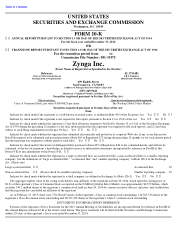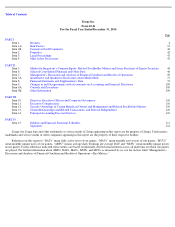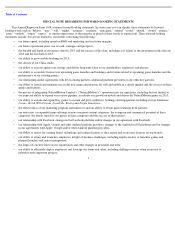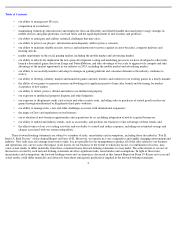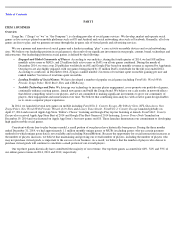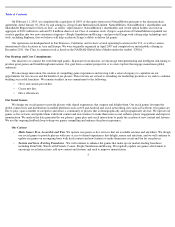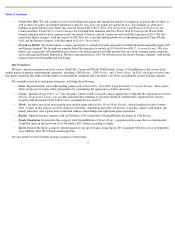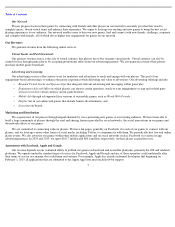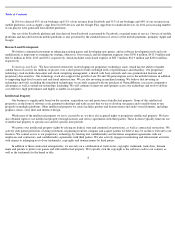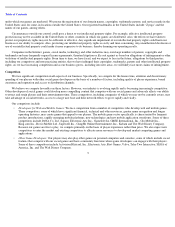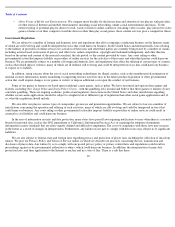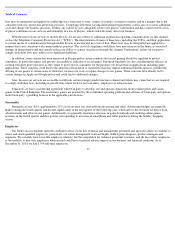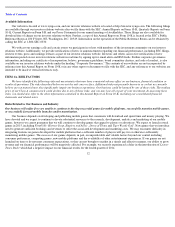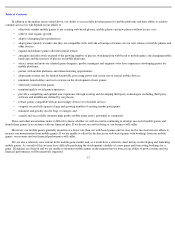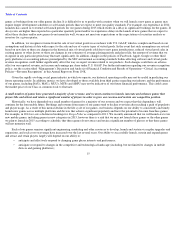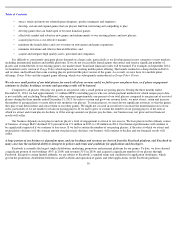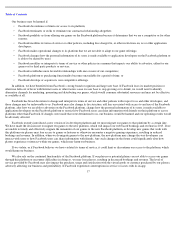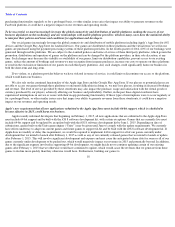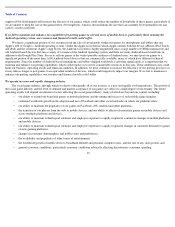Zynga 2014 Annual Report Download - page 12
Download and view the complete annual report
Please find page 12 of the 2014 Zynga annual report below. You can navigate through the pages in the report by either clicking on the pages listed below, or by using the keyword search tool below to find specific information within the annual report.
Table of Contents
under which our games are marketed. We pursue the registration of our domain names, copyrights, trademarks patents, and service marks in the
United States and, for some, in locations outside the United States. Our registered trademarks in the United States include “Zynga” and the
names of our games, among others.
Circumstances outside our control could pose a threat to our intellectual property rights. For example, effective intellectual property
protection may not be available in the United States or other countries in which our games are distributed. Also, the efforts we have taken to
protect our proprietary rights may not be sufficient or effective. Any significant impairment of our intellectual property rights could harm our
business or our ability to compete. Also, protecting our intellectual property rights is costly and time-
consuming. Any unauthorized disclosure or
use of our intellectual property could make it more expensive to do business, thereby harming our operating results.
Companies in the Internet, games, social media, technology and other industries may own large numbers of patents, copyrights and
trademarks and may frequently request license agreements, threaten litigation or file suit against us based on allegations of infringement or other
violations of intellectual property rights. From time to time, we have faced, and we expect to face in the future, allegations by third parties,
including our competitors and non-practicing entities, that we have infringed their copyrights, trademarks, patents and other intellectual property
rights. As we face increasing competition and as our business grows, including into new areas, we will likely face more claims of infringement.
Competition
We face significant competition in all aspects of our business. Specifically, we compete for the leisure time, attention and discretionary
spending of our players with other social game developers on the basis of a number of factors, including quality of player experience, brand
awareness and reputation and access to distribution channels.
We believe we compete favorably on these factors. However, our industry is evolving rapidly and is becoming increasingly competitive.
Other developers of social games could develop more compelling content that competes with our social games and adversely affects our ability
to attract and retain players and their entertainment time. These competitors, including companies of which we may not be currently aware, may
take advantage of social networks, access to a large user base and their network effects to grow rapidly and virally.
Our competitors include:
9
•
Developers for Web and Mobile Games:
We face competition from a number of competitors who develop web and mobile games.
These competitors, some of which have significant financial, technical and other resources, greater name recognition and longer
operating histories, may create games that appeal to our players. The mobile game sector specifically is characterized by frequent
product introductions, rapidly emerging mobile platforms, new technologies and new mobile application storefronts. Some of these
competitors include DeNA Co. Ltd. (Japan), Electronic Arts Inc., Gameloft SA, GREE International, Inc., Glu Mobile Inc.,
King.com Inc., Rovio Mobile Ltd., Supercell Inc., GungHo Online Entertainment, Inc., Kabam and The Walt Disney Company.
Because our games are free to play, we compete primarily on the basis of player experience rather than price. We also expect new
competitors to enter the market and existing competitors to allocate more resources to develop and market competing games and
applications.
•
Other Game Developers: Our players may also play other games on personal computers and consoles, some of which include social
features that compete with our social games and have community functions where game developers can engage with their players.
Some of these competitors include Activision Blizzard, Inc., Electronic Arts, Riot Games, Valve, Take-Two Interactive, SEGA of
America, Inc. and The Walt Disney Company.


